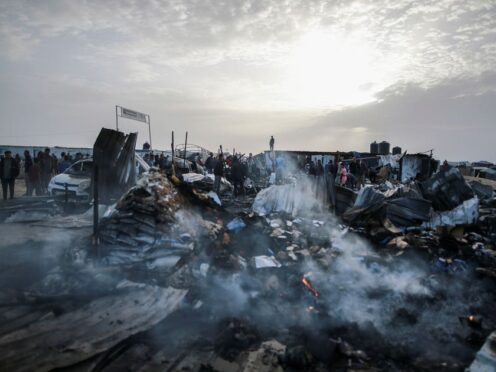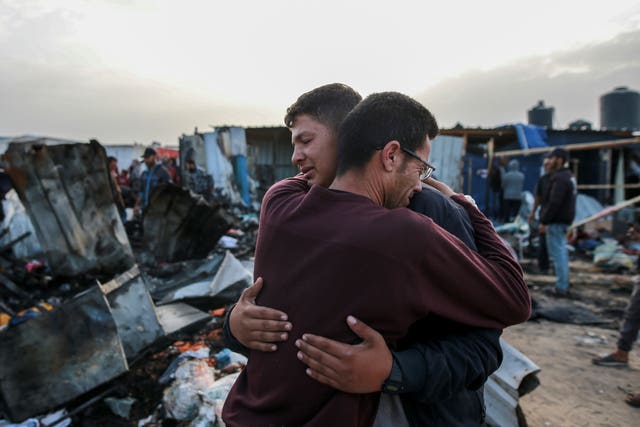
Israel is facing new condemnation for strikes on the Gaza city of Rafah that local health officials said killed at least 45 Palestinians, including displaced people living in tents that were engulfed by fire.
Israel has faced surging international criticism over its war with Hamas, with even some of its closest allies, particularly the United States, expressing outrage at civilian deaths. Israel asserts that it adheres to international law even as it faces scrutiny in the world’s top courts, one of which last week demanded that it halt its offensive in Rafah.
Israel said it was looking into the civilian deaths, saying it struck a Hamas installation and killed two senior Hamas militants. Sunday night’s attack, which appeared to be one of the war’s deadliest, helped push the overall Palestinian death toll in the war above 36,000, according to the Gaza Health Ministry, which does not distinguish between fighters and non-combatants in its tally.
“We pulled out people who were in an unbearable state,” said Mohammed Abuassa, who rushed to the scene in the north-western neighbourhood of Tel al-Sultan. “We pulled out children who were in pieces. We pulled out young and elderly people. The fire in the camp was unreal.”
The Gaza Health Ministry said around half of the dead were women, children and older adults. On Monday, barefoot children poked at the blackened debris as searches continued.
France, a close European ally of Israel, said it was “outraged” by the violence.
Outraged by the Israeli strikes that have killed many displaced persons in Rafah.
These operations must stop. There are no safe areas in Rafah for Palestinian civilians.
I call for full respect for international law and an immediate ceasefire.
— Emmanuel Macron (@EmmanuelMacron) May 27, 2024
“These operations must stop. There are no safe areas in Rafah for Palestinian civilians. I call for full respect for international law and an immediate ceasefire,” French President Emmanuel Macron posted on X.
Rafah, the southernmost Gaza city on the border with Egypt, had been housing more than a million people – about half of Gaza’s population – displaced from other parts of the territory. Most have fled once again since Israel launched what it called a limited incursion there earlier this month. Hundreds of thousands are packed into squalid tent camps in and around the city.
Israeli Prime Minister Benjamin Netanyahu says Israel must destroy what he calls Hamas’s last remaining battalions in Rafah. The militant group on Sunday launched a barrage of rockets from the city towards heavily populated central Israel, setting off air raid sirens but causing no injuries.
Italian Defence Minister Guido Crosetto said that bombings like the one in Rafah will have long-standing repercussions for Israel.
“Israel with this choice is spreading hatred, rooting hatred that will involve their children and grandchildren. I would have preferred another decision,″ he told SKY TG24.

Qatar, a key mediator between Israel and Hamas in attempts to secure a ceasefire and the release of hostages held by Hamas, said the strikes could “complicate” talks. Negotiations, which appear to be restarting, have faltered repeatedly over Hamas’s demand for a lasting truce and the withdrawal of Israeli forces, terms Israeli leaders have publicly rejected.
Neighbouring Egypt and Jordan, which made peace with Israel decades ago, also condemned the Rafah strikes. Egypt’s Foreign Ministry described the strike on Tel al-Sultan as a “new and blatant violation of the rules of humanitarian international law”. Jordan’s Foreign Ministry called it a “war crime”.
The Israeli military’s top legal official said authorities were examining the strikes and that the military regrets the loss of civilian life. Military Advocate General Major General Yifat Tomer-Yerushalmi said such incidents occur “in a war of such scope and intensity”.
Speaking to an Israeli lawyers’ conference, Tomer-Yerushalmi said Israel has launched 70 criminal investigations into incidents that aroused suspicions of international law violations, including the deaths of civilians, the conditions at a detention facility holding suspected Palestinian militants and the deaths of some inmates in Israeli custody. She said incidents of “violence, property crimes and looting” were also being examined.
Israel has long maintained it has an independent judiciary capable of investigating and prosecuting abuses. But rights groups say Israeli authorities routinely fail to fully investigate violence against Palestinians and that even when soldiers are held accountable the punishment is usually light.
Israel has adamantly denied allegations of genocide brought against it by South Africa at the International Court of Justice. Last week, the court ordered Israel to halt its offensive in Rafah, a ruling that it has no power to enforce.
Separately, the chief prosecutor at the International Criminal Court is seeking arrest warrants against Mr Netanyahu and Israeli defence minister Yoav Gallant, as well as three Hamas leaders, over alleged crimes linked to the war.
Israel says it does its best to adhere to the laws of war and says it faces an enemy that makes no such commitment, embeds itself in civilian areas and refuses to release Israeli hostages unconditionally.
Hamas triggered the war with its October 7 attack into Israel, in which Palestinian militants killed some 1,200 people, mostly civilians, and seized some 250 hostages. Hamas still holds about 100 hostages and the remains of around 30 others after most of the rest were released during a ceasefire last year.
Around 80% of Gaza’s 2.3 million people have fled their homes, severe hunger is widespread and UN officials say parts of the territory are experiencing famine.

Enjoy the convenience of having The Sunday Post delivered as a digital ePaper straight to your smartphone, tablet or computer.
Subscribe for only £5.49 a month and enjoy all the benefits of the printed paper as a digital replica.
Subscribe